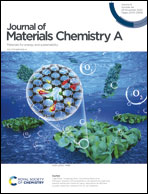Colloidal three-dimensional covalent organic frameworks and their application as porous liquids†
Abstract
Developing solid porous materials into free-flowing liquids with permanent porosity is a promising strategy for overcoming certain limitations of conventional sorbent materials employed in gas storage and separation applications. The ability to control the pore size and chemical functionalities of organic frameworks gives these particular nanoporous materials distinct advantages over other small cage-like molecules or hollow particles that have been developed into porous liquids. Here, we describe the synthesis of a 3D imine-linked colloidal covalent organic framework (COF)-based porous liquid, designed for efficient size-exclusion of solvent, as well as for long-term stability. By tethering ionic liquids to the colloid surface, the colloids can be dried, purified, and resuspended in a variety of solvents without irreversible aggregation typically observed of COF colloids. Colloid size could be controlled between 50 and 400 nm, with surface areas as high as 800 m2 g−1. The 3D intertwining morphology of the colloids had pore sizes ranging from 5 to 14 Å, allowing them to efficiently size-exclude bulky ionic liquids. The COF colloids were stable towards flocculation in an ionic liquid for >1 year. Permanent porosity was confirmed with a combination of 19F NMR measurements and gas sorption techniques. CO2 and CH4 uptake in these porous liquids increased more than 10 and 20-fold, respectively, over non-porous, neat ionic liquid control samples. The work not only advances the state of COF-based colloid science but also represents a practical advance towards developing more robust, tunable framework-based porous liquid materials for a host of gas storage and separation applications.



 Please wait while we load your content...
Please wait while we load your content...